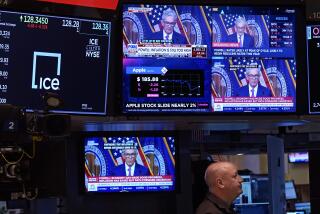It’s a Money Mystery as Short-Term Assets Dip
- Share via
Here’s a mystery that has market watchers scratching their heads: Where has all our short-term money gone?
In recent years, individual investors had poured cash into money market mutual funds at a rate that lifted retail money fund assets nearly 20% a year.
Yet, since the beginning of this year, money fund assets have grown by just $60.8 billion to $928.8 billion, according to figures released Wednesday by the IBC Money Fund Report. That represents a modest 7% increase. By comparison, retail money fund assets had shot up 13.3% by this time last year.
But it’s not just money funds:
* Assets held in certificates of deposit are down about $24.9 billion since the beginning of this year, according to the Federal Reserve Board’s measure of “small” CDs at banks and thrifts, or those under $100,000.
* Total checkable deposits--a measure of checking and related accounts--are also down since the start of the year.
“It’s all quite curious,” says Peter Crane, managing editor of IBC.
Stock and bond mutual funds aren’t getting that short-term money, because net inflows into the funds are down this year.
Could Americans be paying down debt? “They sure as hell aren’t doing that,” says Lou Harvey, president of Dalbar, a Boston-based research firm that tracks the financial services industry. Consumers have been on a borrowing binge since mid-1998.
That seems to leave only a few possible explanations: Americans are using this money to buy individual stocks and bonds, they’re spending it, or they’re stockpiling it in case of a year 2000 computer disaster.
“My guess is they’re spending it down,” says Duke Johnson, president of the La Jolla Institute for Wealth Management in San Diego County. He notes, for instance, that one of his clients just shelled out $250,000 on a ‘round-the-world vacation, which is extravagant even by that person’s standards.
Adds Crane: “Consumers are just treating themselves.”
This would explain why sales of existing single-family homes jumped to the highest level ever in June, according to the National Assn. of Realtors. And why sales of cars and light trucks continue to set records. And why retail sales growth persists.
It would also explain why the national savings rate fell to minus 1.4% in May and minus 1% in June, says Paul Kasriel, chief U.S. economist for Northern Trust Co. in Chicago. (Critics note that the savings rate data are flawed because they don’t include retirement accounts, but the trend is relevant.)
“That’s sort of the wealth effect,” Kasriel says. “They feel wealthier from the stock market, so they go out and spend more.” Yet, this spending--and a decline in short-term cash “cushions”--threatens to weaken household balance sheets, Kasriel argues.
“While assets are going up, so are liabilities” in the form of consumer debt, he says. “Now, assets are going up in value faster than liabilities, but that’s because of capital gains. If those capital gains go away--for instance, if the stock market goes down or housing prices go down--the debt will still be there. And there could be some real troublesome issues to deal with.”
Exacerbating the problem, economists note, is that with interest rates rising, home mortgage refinancing activity has slowed, sapping a source of extra cash for American households.
In fact, Charles Biderman, president of the Santa Rosa, Calif., research firm Trimtabs.com, argues that the drop-off in home refinancing may be the real culprit in this short-term-cash mystery.
He notes, for instance, that in the fourth quarter of last year, as interest rates fell, homeowners refinanced their home mortgages to the tune of about $4 billion a week.
Now, with market interest rates up sharply, refinancing activity has plummeted and “mortgage refis are generating less than $1 billion weekly of extra cash going into the checking accounts and money market funds of homeowners,” Biderman says.
In other words, many people may not be spending more or saving less--they just lack the refi windfall of recent years.
Brian Reid, economist at Investment Company Institute, the mutual funds’ chief trade group, agrees that the slowdown in refi activity may be having an effect.
What could drive Americans to increase their short-term cash cushions? Fear of an economic slowdown--or of a stock market plunge--would probably do it, experts say.
*
Times staff writer Paul J. Lim can be reached at paul.lim@latimes.com.
(BEGIN TEXT OF INFOBOX / INFOGRAPHIC)
Where’s the Cash?
There’s less money in checking accounts and small certificates of deposits now than at the end of last year. Meanwhile, assets in retail money market mutual funds are up, but growth has been half what it was last year. The data suggest many Americans’ short-term savings cushion is dwindling. Data for CDs, money funds and checking accounts, year-end and latest available, in billions of dollars:
Small certificates of deposit (under $100,000)
Dec. 31: $951
Latest*: $926
*
Checking and related deposits
Dec. 31: $640
Latest*: $600
*
Retail money market funds
Dec. 31: $868
Latest*: $929
*July 19 for CDs and checking: Aug. 4 for money funds
Source: Federal Reserve, IBC Money Fund Report
More to Read
Inside the business of entertainment
The Wide Shot brings you news, analysis and insights on everything from streaming wars to production — and what it all means for the future.
You may occasionally receive promotional content from the Los Angeles Times.










